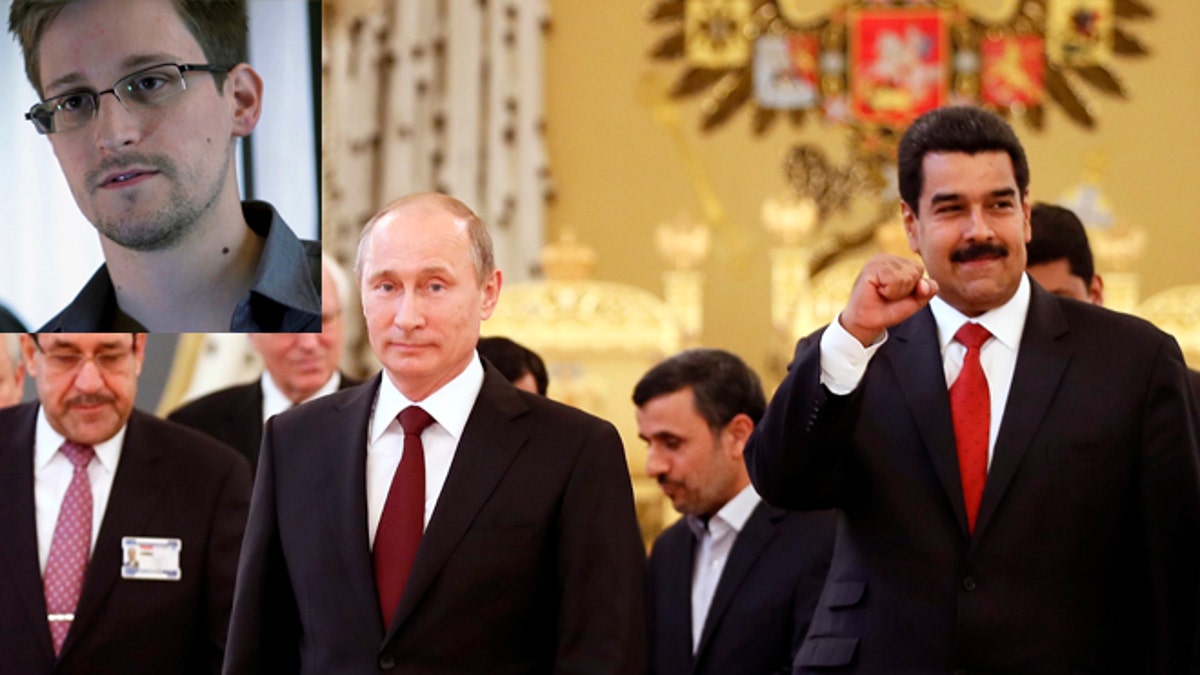
Edward Snowden pictured left, Russian President Vladimir Putin, second left, front, and Venezuelan President Nicolas Maduro, right, Iranian President Mahmoud Ahmadinejad, center rear, pose for a photo at the Gas Exporting Countries Forum (GECF) in the Andrew (Throne) Hall in the Grand Kremlin Palace in Moscow, Monday, July 1, 2013. (AP Photo/Yuri Kochetkov, Pool) (AP2013)
MOSCOW – NSA leaker Edward Snowden has canceled his asylum bid in Russia, Russian media reported Tuesday, broadening his search for refuge outside the United States to include much of Latin America, especially Venezuela.
Russian news agencies Tuesday quoted President Vladimir Putin's spokesman Dmitry Peskov as saying that Snowden withdrew his request when he learned about the terms Moscow has set out. Putin said on Monday that Russia is ready to shelter Snowden as long as he stops leaking U.S. secrets.
At the same time, Putin said he had no plans to turn over Snowden to the United States.
Several of the other countries where WikiLeaks says Snowden has applied for asylum have said he cannot apply from abroad. Officials in Germany, Norway, Austria, Poland, Finland and Switzerland all said he must make his request on their soil.
WikiLeaks said requests have also been made to Bolivia, Brazil, China, Cuba, Ecuador, France, Iceland, India, Italy, Ireland, Netherlands, Nicaragua, Spain and Venezuela.
Venezuela's President Nicolas Maduro, who is visiting Moscow, told Russian reporters on Tuesday that his country has not received an application for asylum from Snowden. Maduro dodged the question whether he may take Snowden away with him to Venezuela.
Maduro also said he would not give Snowden safe passage back to Caracas on his private plane. But Maduro has not completely shut the door on the possibility that Venezuela might one day give shelter to the American fugitive.
“He did not kill anyone and he did not plant a bomb,” Maduro told the Russian media, according to the New York Times. “He only said a big truth to prevent wars.”
A Russian newspaper, the NYT reports, added fuel to the fire by speculating that Maduro was arranging for his private plane to take off from Sheremetyevo instead of a government airport. Putin denied knowing of any such plan.
The alliance between Venezuela and Russia is on full display this week and Snowden offers an avenue for Maduro to continue the work of his predecessor, Hugo Chávez, by using incidents like this to blast U.S. imperialism and foreign policy.
WikiLeaks also posted a statement attributed to Snowden on its website late Monday, in which he slams President Barack Obama for "using citizenship as a weapon."
"Although I am convicted of nothing, (the United States) has unilaterally revoked my passport, leaving me a stateless person," Snowden says in the statement. "Without any judicial order, the administration now seeks to stop me exercising a basic right. A right that belongs to everybody. The right to seek asylum.
"Their purpose is to frighten, not me, but those who would come after me."
The asylum requests reported by WikiLeaks and the Snowden statement could not be independently authenticated.
Snowden, who has been on the run since releasing sensitive NSA documents, is believed to have been in Moscow airport's transit zone since his arrival from Hong Kong on June 23.
WikiLeaks legal adviser Sarah Harrison delivered the requests for asylum to an official at the Russian consulate at the Moscow airport on Sunday, according to the group that has adopted Snowden and his cause.
The U.S. has annulled Snowden's passport, and Ecuador, where he had initially hoped to get asylum, has been giving mixed signals about offering him shelter.
The expanded requests for asylum come as the Obama administration contends with European allies angry about the release of documents that alleged U.S. eavesdropping on European Union diplomats.
Obama said Monday that the U.S. would provide allies with information about new reports that the NSA had bugged EU offices in Washington, New York and Brussels. But he also suggested such activity by governments would hardly be unusual.
French President Francois Hollande said Tuesday that France has "not received any particular requests from Mr. Snowden." He also called for a common EU stance on the NSA snooping.
France prides itself on being a haven for political prisoners, and offers asylum to more people annually than any other country but the United States. French politicians on the far right and far left have called for France to take Snowden in — as have members of the Green party, which is a part of Hollande's Socialist-led government. However, it is unlikely that France would take in Snowden. Hollande and leading French officials, despite outraged comments in recent days, sees the US as a key ally.
A foreign ministry spokeswoman in China and an Interior Ministry spokesman in Spain both said they were not aware about Snowden's possible plea to seek asylum in their respective countries.
Based on reporting by the Associated Press.
